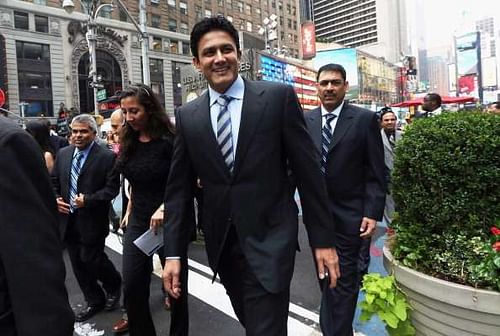
Questions raised against Anil Kumble's appointment show that India doesn't deserve sporting heroes
Kolkata 1993, Delhi 1999, Antigua 2002, Kolkata 2005, London 2007, and the list goes on.
Anil Kumble’s moments of magic under the sun have been aplenty and it’s not for nothing that in a country that produces spin bowlers in dozens each year, he is arguably the greatest ever to play the game. Look beyond Bishen Bedi’s guile and Harbhajan SIngh’s tact, and you will remember a lanky leg-spinner running into bowl with a fast-bowlers action. Be it on dead highways, green seamers or rank turners; be it to win or to draw, or to simply show that India wasn’t a meek side, the lion heart has rolled his shoulder for the national team for over 55,000 times.
But not surprisingly, in a country that often idolizes its batsmen and places cricketers’ achievements in the order of the number of runs he has scored, a champion has been disrespected to no extent.
Kumble’s appointment as a coach came in the backdrop of immense speculation regarding who would fill Duncan Fletcher’s shoes as full-time India coach, and amid hushed murmurs that the hot seat was being warmed up for Ravi Shastri. While some quarters have celebrated, a large section of the Indian media seems to have been grumbling over Kumble’s appointment.
Also read: Javagal Srinath confident of Anil Kumble's success as India's new head coach
And it is simply unfortunate that when servants of the game choose to look beyond their personal interests and stand up to give back to the country, people mock them, disregard them and question their credentials.
Here are a few misconceptions that need to be cleared about Kumble’s appointment.
Doesn’t meet criteria
In a bid to show the Supreme Court that things were indeed transparent and fair in Indian cricket circles, the BCCI did the unthinkable this time around – advertised for the head coach’s position on 1 June. Among the many requirements that were listed, two which caught the eye were – one needs to have a reasonable grasp of Hindi as a language, and one needs to have the prior experience of having coached an international or domestic team.
So when Kumble’s name was doing rounds as a frontrunner, the most blatant ammunition that backers of other candidates had against him was the fact that he didn’t have coaching experience, initiating the start of the ridiculousness of epic proportions.
A former India Test captain with 956 international wickets to his name, a player who was active for over two decades having had experience of playing in every single territory in the world stage, having been there done that umpteen number of times was made to lay bare his worthiness for the top job.
Much to the detractors’ chagrin, Kumble came up with the best road map one possibly could, highlighting his plans for each of the three formats. So much so that a panel consisting of three of India’s greatest batsmen were bowled over by his vision, while other candidates chose to harp upon what they have done till now over video conferencing from a foreign locale.
Also read: India 'A' squad announced for Australia tour, Naman Ojha named captain
Many say being a coach and a player are two different ball games altogether, but fail to look at the fact that many with stellar coaching experience and a file full of coaching certifications sat inept when India got drubbed overseas over a period of nearly four years.
Does Kumble fit the criteria listed by the board? No. Does he qualify the test to be India coach? Yes.
One cannot simply disregard the qualitative experience that Kumble carries as a result of his leadership stints and it would have been India’s loss had he not applied.
Selected by his teammates
Another major theory doing rounds is that there was an apparent conflict that Kumble was selected by his former teammates, and as a result had a positive bias going in his favour.
While there would be a match of brainwaves between Kumble and the likes of Sourav Ganguly, Sachin Tendulkar, and VVS Laxman – it’s insult number two if people raise fingers at the integrity and capability of individuals who had revived Indian cricket from the doldrums of match fixing and mediocrity.
What makes this time’s selection so unique is that for the first time in this millennium, an out and out preference had been stated for a domestic coach, unlike in the past when committees comprising of Sunil Gavaskar and Shastri oversaw the appointment of foreign names such as Greg Chappell.
So what would the solution be to waive off this supposed conflict? Appointment of a selection panel comprising of stars of the 70s and the 80s, who have no understanding of the modern game or a committee of select foreign cricketers who would help decide an Indian coach?
The fact that there were no noises when this very Cricket Advisory Committee was appointed (at that time, it was heralded as the best thing to happen to Indian cricket) and when this very committee approved Shastri’s performances, bring to the fore the duality of India’s cricket pundits, changing colours as per convenience.
